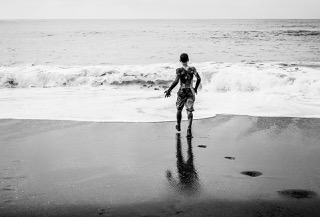Liminal Space | COVID-19 Conversations with Pat & Tammy McLeod
April 24, 2020Hopes & Dreams | COVID-19 Conversations with Pat & Tammy McLeod
April 28, 2020Questions: Faith & Covid-19
By Ron Sanders, Campus Minister with Cru at Stanford University, Associate Faculty in Christian Ethics at Fuller Theological Seminary

What happens when our questions outstrip our ability to understand our experience? It is one of the uniquely human dilemmas that we face—to try to make sense of the, sometimes, random events in our lives and find meaning in them. Boss maintains that the more meaning that we can find through our experience, the more resilient that we will be through loss.
A famous German pastor and theologian, Dietrich Bonhoeffer, wrote a small book titled, Christ the Center. In this book, Bonhoeffer pinpoints one of the struggles of our existence—we are born in the “middle.” What he means by this is that we are born into a world already in motion. We didn’t start the motion, and we won’t finish the motion; we are just thrust into it. So we need some orienting points to help us find our bearings. This is true when we are thrust into a global pandemic that is wreaking havoc on our health (mental and physical), our relationships, and our economy.
So far in this series, we have tried to write about some orienting points to try to help manage life during Covid-19. There are relational orienting points: our families, our friendships, our faith; there are personal orienting points: naming our losses, going through the stages of grief, taking up certain practices like meditating on the Scriptures and doing the prayer of examine, sleeping; and there are communal orienting points: corporate prayer like a litany, ceremonies, art. These are all things that can help provide meaning when our experience runs out ahead of our capacity to comprehend all that is going on around us.

Faith in God is one of those orienting points for me. Here is how I think about it—If I exist in the “middle” of a story that is not complete, and I think that the author of that story is good, I might have some kind of expectation that they would reveal themselves to me in some kind of way…give me a sense of presence and purpose. Bonhoeffer maintains that this is what God does in the person of Jesus of Nazareth. Jesus is the reflection of God in the world (Colossians 1.15-17) who has come to reveal who God is (John 14.9), what God might expect of us, and how to live well in the world that God put into motion (Matthew 22.34-40). One of the themes that runs through Bonhoeffer’s work that I resonate with and drift toward in times of difficulty is that Jesus doesn’t just stand outside the world and tell us what to do, he entered into it with vulnerability (as a baby—Immanuel means “God with us”), grew into maturity, and experienced suffering and loss with us. In the Christian tradition, a Roman cross became the central symbol of God’s shared experience with human beings—a suffering alongside of us and also for us. And in the Christian tradition, the resurrection is the redemptive event that brings meaning and hope to that suffering—God’s presence and activity to set the world right.
My faith doesn’t answer all of my questions; there are things I just do not or cannot know. Why Covid-19, why now, how long? But something that I have been thinking about as an anchor through all of my questions is this idea of God with us.
Photography by Bonnie Sanders
